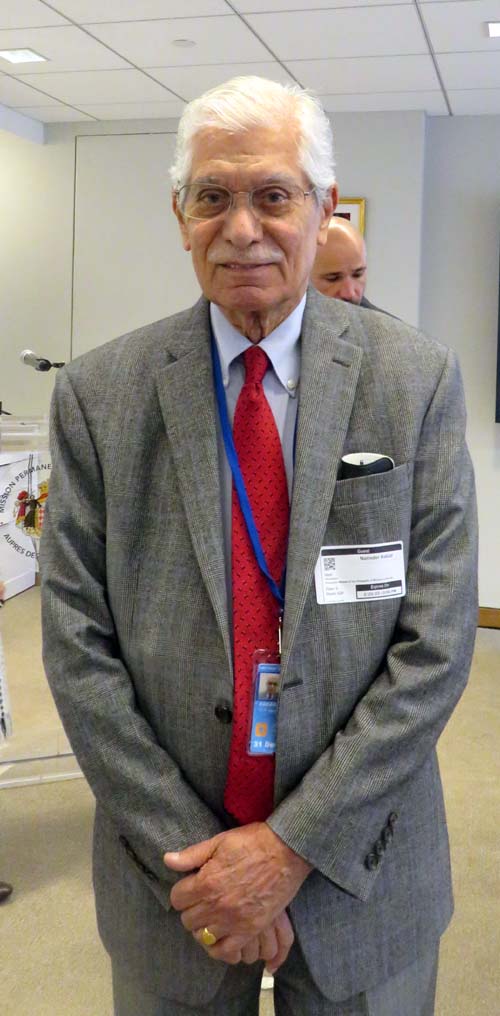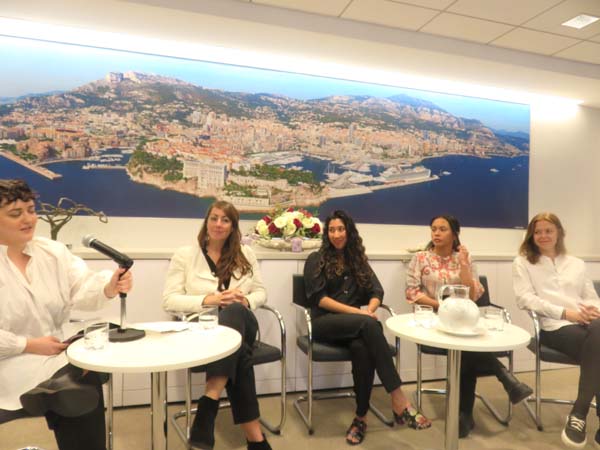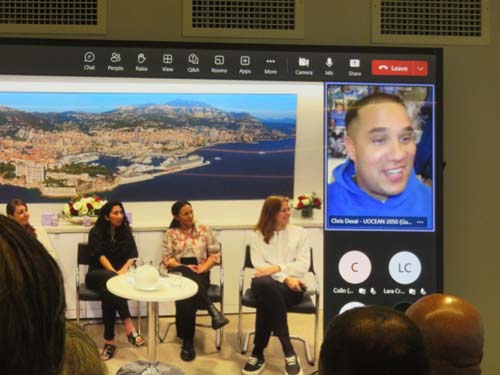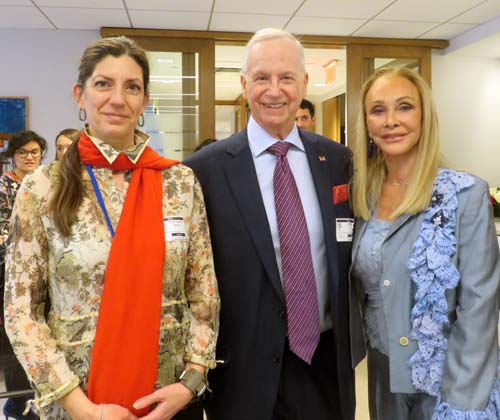|
Society News
1
2
3
4 5
6 |
|
Share this page with your friends |
|
|
www.blacktiemagazine.com
Barbara Winston / Water and Peace Innovation
Photos and Reporting
by: Joyce Brooks/BlackTieMagazine.com
|
 |
Barbara Winston,
Founder, Chair and President
Commission for Peace |
and
H.E. Isabelle Picco,
Ambassador of Monaco to the UN |
 |
#peaceinnovationinitiative #PII #dnaofpeace #boldpeace
#positivedisruption
#upeace #unwaterconference2023
|
|
The Peace Innovation Initiative
accelerates sustainable solutions for locally-informed
and global-minded water action New York, NY, March 24 2023
The UN Water Conference provided a unique opportunity
to connect local and global actors
and diverse industries
from around the world
as we
“unite for water.”
Alongside the conference,
the Peace Innovation Initiative (PII),|
in collaboration with
the Permanent Mission of Monaco to the United Nations,
the Permanent Mission of Costa Rica to the United
Nations,
and the Permanent Observer Mission of the
University for Peace (UPEACE)
presented their panel session,
Water and Peace Innovation:
Uniting Local and Global Efforts for Sustainable
Development.
With the recognition that all stakeholders must convene
under a sharedcommitment to inclusivity,
action, and cross-sectoral partnership,
the panel session invited global cross-sector leaders from
the
United Nations and the private sector into conversation with local
peacebuilders, activists, and scholars working within
intersections of water, health, and peace
in order to accelerate the development of
sustainable solutions.
Held at the Permanent Mission of Monaco to the United Nations
in New York, and sponsored by Bond No. 9 New York,
speakers and panelists discussed data, social
and technological resources, and cross-disciplinary partnerships
already being used in various sectors
and local communities to make progress towards
SDG6 (Clean Water and Sanitation).
|
|
|
 |
|
Barbara Winston |
"I'm passionately committed to ending
violence against women and girls
and achieving gender equality.
My mission is to deconstruct the root causes of violence
against women and girls through education and collaborations
with individuals and organizations that can build capacity
and momentum.
“When women and girls are subjugated and not treated as equals, as humans
deserving of the same treatment as men, society cannot
flourish
and evolve to its fullest potential.”
These thoughts and ideals are from a series
of articles I wrote
for the Huffington Post.
There are many reasons to pursue these ideals: not only do
we have a moral and ethical obligation, but treating women
and girls as equals delivers economic benefits for all". |
 |
H.E. Isabelle Picco,
Ambassador of Monaco to the UN
|
 |
H.E. Lachezara Stoeva,
President of ECOSOC and Ambassador of Bulgaria to the UN
|
 |
Mr.
Nikhil Seth,
Executive Director of UNITAR
|
 |
H.E. Maritza Chan,
Ambassador of Costa Rica to the UN
|
 |
|
H.E. Narinder Kakar,
Ambassador of UPEACE to the UN
|
 |
Whitney Bauck,
Journalist and Climate Solutions Fellow
Emilie McGlone,
Director of Peace Boat,US,
Chris Desai,
Founder & CEO of UOCEAN 2050 and the Vayuu Foundation,
Aleks Gosiewski,
Co-Founder & COO of Keel Labs,
Kristy Drutman,
Founder of Brown Girl Green & Co, Founder of the Green Job
Board,
Erica Asinas,
Policy Advisor with the Urban Ocean Lab |
 |
|
|
 |
Gordon Winston,
Managing Partner, Inventive Capital
Member Commission for Peace,
Patrick Flanagan,
Director 50 Shades Greener
Raquel Noboa,
Founder & CEO 50 Shades Greener
Barbara Winston,
Founder, Chair and President
Commission for Peace
|
 |
Walter Raquet,
Chairman, Matrics2.com
Solution to Global Cybercrime |
 |
|
Mr. Nikhil Seth,
Executive Director of UNITAR and Barbara Winston |
 |
|
Barbara Winston |
 |
|
Barbara Winston |
 |
Sharina Perry,
Founder/Inventor/Chief Executive Officer
Utopia Plastix
James Bradley,
Partner/Senior Vice President of Operations
Utopia Plastix |
 |
|
Walter Raquet and
Barbara Winston |
 |
|
Barbara Winston |
 |
Joyce Brooks
Editor-in-Chief
Black Tie International Magazine
|
|
|
The Peace Innovation
Initiative accelerates sustainable solutions for
locally-informed and global-minded water action New York,
NY, March 2023
The UN Water Conference provided a unique opportunity to
connect local and global actors and diverse industries from
around the world as we “unite for water.”
Alongside the conference, the Peace Innovation Initiative (PII),
in collaboration with the Permanent Mission of Monaco to the
United Nations, the Permanent Mission of Costa Rica to the
United Nations, and the Permanent Observer Mission of the
University for Peace (UPEACE) presented their panel session,
Water and Peace Innovation: Uniting Local and Global Efforts
for Sustainable Development.
With the recognition that all stakeholders must convene
under a shared commitment to inclusivity, action, and cross-sectoral
partnership, the panel session invited global cross-sector
leaders from the United Nations and the private sector into
conversation with local peacebuilders, activists, and
scholars working within intersections of water, health, and
peace in order to accelerate the development of sustainable
solutions.
Held at the Permanent Mission of Monaco to the United
Nations in New York, and sponsored by Bond No. 9 New York,
speakers and panelists discussed data, social and
technological resources, and cross-disciplinary partnerships
already being used in various sectors and local communities
to make progress towards SDG6 (Clean Water and Sanitation).
Introductory remarks were given by co-host, H.E. Ms.
Isabelle Picco, Ambassador & Permanent Representative of
Monaco to the United Nations and H.E. Ms. Maritza Chan,
Ambassador & Permanent Representative of Costa Rica to the
United Nations.
Keynote speakers included H.E. Ms. Lachezara Stoeva,
Ambassador & Permanent Representative of Bulgaria to the
United Nations and President of the United Nations Economic
and Social Council (ECOSOC) as well as Mr. Nikhil Seth,
Assistant Secretary-General and Executive Director of the
United Nations Institute for Training & Research (UNITAR).
The panel session proceeded, led by Journalist & Climate Solutions Fellow,
Whitney Bauck and was comprised of Emilie McGlone, Director
of Peace Boat US, Chris Desai, Founder & CEO of UOCEAN 2050
and the Vayuu Foundation, Aleks Gosiewski, Co-Founder & COO
of Keel Labs, as well as Kristy Drutman, Founder of Brown
Girl Green & Co-Founder of the Green Job Board, and Erica
Asinas, Policy Advisor with the Urban Ocean Lab.
Interactive discussion with audience members then began,
focusing on topics such as healthy water governance and
effective utilization of ocean and water resources to
counter historically exploitative practices.
Additionally, conversation explored the creation of a better foundation
upon which we might observe added value for our oceans, and
how local solutions for global water issues could be
elevated to amplify diverse voices, bridge agendas, and
integrate multigenerational efforts.
Concluding remarks were provided by PII President & Founder,
Ms. Barbara Winston, stating “in this ‘watershed moment’ of
the UN Water Conference we believe that sharing space
reconnects us with our genetic capacity to discover unity
amongst our differences… when we get curious together, we
have the power to change the trajectory of humanity and our
relationship with the planet.”
Peace innovation is a reminder that when we connect with
diverse minds and are equipped with the knowledge and skills
of peace, each of our brilliant individual ideas and actions
can then become a building block upon which the entire DNA
of Peace is constructed. Lastly, Ms. Winston announced the
start of the Peace Innovation Initiative’s global
fundraising campaign, an expansion of their DNA of Peace
Fellowship Program, designed with their founding partner,
the University for Peace (UPEACE), and housed at the Global
Center of Peace Innovation.
Using data-driven research to uncover the building blocks
necessary for peace innovation, fellows will incubate and
launch that of their own, partnering with other positive
disruptors across industries to propel transformational
change.
To broaden the scope of who gets a seat at the table and
expand the Fellowship Program to include fellows who can
represent and innovate for peace in every sector and
industry, the Peace Innovation Initiative urges readers to
consider partnering with them to provide mentorship,
technology access, or data that will help fellows launch
their own innovations for our planet and its people.
About The Peace Innovation Initiative: Founded as a
501(c)(3) in November 2021, the Peace Innovation Initiative
is a team of pioneers - bridge-builders committed to making
peace a sustainable reality. Dedicated to the creation and
implementation of a global practice of peace, PII believes
in the power of positive disruption and that conflict can
trigger the reaction to sustainable peace practice.
PII builds the bridge from peace potential to practice by
developing programs that connect innovative minds. For more
information, visit
www.innovatepeace.org
About The
University For Peace Created by the UN General Assembly in
1955, the University for Peace is an educational arm of the
United Nations with its own Permanent Observer Mission.
Training leaders for peace for the past four decades, it is
a unique global academic institution with over 2,000 Alumni
from over 120 countries. Through its Master’s and Doctoral
degree programs, UPEACE assists future leaders to explore
and implement peacekeeping and peacebuilding strategies and
practices to address threats to human and global wellbeing.
The UPEACE experience is uniquely empowering, transformative
and cultivates critical thinking in its students.
For more information, please visit
www.upeace.org |
|
Global Center of
Peace Innovation Call for Fellowship Applications
|
Global Center of
Peace Innovation Call for Fellowship Applications The Global
Center of Peace Innovation at the University for Peace (UPEACE)
is now accepting applications for the DNA of Peace
Fellowship Program, a PhD fellowship program designed and
led in partnership with the Peace Innovation Initiative (PII)
to connect and equip top practitioner-scholars with the
partnerships, spaces, education, and technology necessary to
incubate and lead peace innovation from the ground up,
starting in their own disciplines and communities of action.
Just as the Human Genome Project was a collaborative global
research project committed to “identifying, sequencing, and
mapping all the genes of the human genome” to build a
healthier world, the DNA of Peace Fellowship Project serves
as our first official research project at the Global Center
in Costa Rica: committed to the scientific identification,
sequencing, and mapping of all elements that activate the
“genes” for peace—the building blocks for a peaceful world.
Peace is far too often understood as a vague and idealistic
concept incapable of propelling true change in the world. We
are committed to shifting this narrative and transforming
mere potential for peace into actionable practice with real
world implications across sectors, communities, and
disciplines.
Since March 2021, we have been building a diverse body of
scholars and practitioners to explore the role of positive
disruption in peacebuilding, convening and synthesizing
their insights through a series of global conferences and
roundtable discussions in Central America, Europe, and the
United States.
Through our collective data so far, we know peace innovation
requires building partnerships and shared spaces across a
diverse range of professions, personalities, identities, and
global representation. It harnesses the power of
connectivity to educate people, providing them with the
knowledge and skills needed to co-design practical and
transdisciplinary solutions to the seemingly intractable
barriers to collective wellbeing today.
We also know these systems-based solutions often include
material products but are not exclusively rooted in peace
tech. Social innovations are just as critical to innovative
practice within and across disciplines. Driven by the
understanding that global peace requires personal,
relational, organizational, national, and global wellbeing,
we understand health as the most basic level of peace.
Moreover, the health of humans is intrinsically connected to
and impacted by the health of our planet. In developing a
definition of peace innovation as our foundation for
creating and enabling this new field and global practice, we
are therefore launching our fellowship program for the
2023-2024 Academic Year to begin exploring the role of peace
innovation in health. As we begin to uncover what it means
to research, study, and launch health-and�peace innovation,
we are looking for two practitioner-scholars with expertise
in a relevant health-related topic to join us as we launch
this ground-breaking program at our research lab: the Global
Center.
Throughout the course of the three-year PhD program at
UPEACE, they will begin developing the genetic map of peace
within the field of health, collectively exchanging their
diverse ideas with other pioneer bridge�builders and using
data-driven research, testing, and analysis to scale their
innovations for broader impact across disciplines. Important
Dates ● Fellowship Term: July 2023 - August 2026 ● Accepting
Applications: 27 Jan 2023 - 25 March 2023 ● Application
Review: March 2023 - April 2023 ● Selection Announcement:
May 2023 ● Beginning of the program: July 2023 Program
Offerings As they transform academic theory and discourse
into engaged practice, Fellows will receive ongoing guidance
and support, relevant practical experience, and networking
opportunities from PII, UPEACE and our partner organizations
with the chance to further their work and share their
academic findings through written publications and
high-level talks.
Over the course of the 3 years of the program, fellows will
receive: ● Comprehensive funding for academics, housing, and
research at the Global Center of Peace Innovation; ● Access
to educational and industry-relevant databases and
cutting-edge technology for data collection and analytics,
statistical analysis and secure data archiving; ● Mentorship
from 1 global industry leader relevant to their specific
research focus, with additional opportunities for
advisership from local experts; ● Invitations and
opportunities to participate in events and panel discussions
at the UN and beyond; ● Publication opportunities with the
University for Peace; and ● Teaching opportunities with the
University for Peace (Master’s level) Upon graduation and
successful completion of the Fellowship Program, fellows
will gain: ● The title “Doctor of Philosophy” ● Placement in
a global network to launch their peace innovations with
relevant partners and in contexts best suited to their
sustainable success. ● Access to the global UPEACE
professional and academic community, including in campuses
and offices located in San José (Costa Rica), New York,
Geneva, The Hague, Beijing, Manila, Addis Ababa, Bonn, and
Tegucigalpa. Fellow Profile Traditional PhD programs are
designed to develop original research and train the next
generation of academics within each field of study.
The DNA of Peace Fellowship Program will provide PhD
students with the unique opportunity to develop an
actionable pathway for putting their research into action in
ways that have impact beyond their academic disciplines and
shape their diverse careers as peace innovators for years to
come.
The fellowship program is therefore designed for mid�level
career professionals who have already developed a niche of
study or practice within the field of health and are
interested in building upon their existing knowledge and
experience to develop and launch their peace innovations.
Understanding that global solutions must be co-designed with
the people best positioned to lead the change on-the-ground,
we prioritize the inclusion of leaders who have committed to
playing active roles in broadening the scope of who gets a
seat at the table, for themselves as equally as for others.
Whether these previous roles have been primarily rooted in
academia or organizational program design and operations, we
are looking for experienced practitioner-scholars:
individuals who are committed to the development of both
scholarship and practice and believe in the importance of
translating health-related research into practical and
sustainable solutions.
We believe that any innovative solution is only as
sustainable as the extent to which it integrates
collaboration across fields, through a systems-based
approach. With this in mind, we seek applicants who approach
problems through a transdisciplinary lens, committed to
understanding the intersections of health with armed
conflict, environmental changes, and inequity, and
illuminating the drivers of conflict and disease.
Whether they are a peacebuilder, educator, doctor,
environmentalist or public health professional, candidates
should be experienced in developing comprehensive strategies
for health and peace alongside other cross-sectoral
professionals and excited about harnessing the power of
intersectional research for the accelerated development of
effective solutions in health.
Research Criteria Through the DNA of Peace Fellowship
Program, we are collectively creating the first�ever body of
knowledge on peace innovation to support meaningful and
sustainable impact for our collective future. As part of
this first Fellowship cohort, our two chosen fellows will be
expected to produce original dissertation research that
contributes to collectively answering the question:
What is peace innovation in health, and what does it
require? In tandem with their PhD programs at UPEACE, they
will together uncover the fundamental elements of peace and
peacebuilding to support their own development of peace
innovations within the health sector.
With this in mind, the dissertation research criteria we
expect from our fellows parallels the profile of our
fellows, focusing on the theoretical and practical
intersections of health, peace and innovation.
The kinds of questions we expect fellows to ask include: ●
How does strengthening the infrastructure of peace intersect
with strengthening the infrastructure of health? How does
lack of access to healthcare contribute to conflict? ● How
do we create systemic structures that uplift the communities
disproportionately impacted by violence and illness? ● How
can health tech be designed to promote peace? ● What
connections exist between public health and peacebuilding
from a communication perspective? Is it possible to have a
standard blueprint? (i.e. core principles of healthcare,
conflict prevention, and humanitarian assistance) ● How can
we use big data to connect health-related conflicts to other
global problems (climate change, discrimination of people
with disabilities, gender�based violence, protection of
indigenous knowledge, etc.) ● What new methodologies can be
developed to better understand the linkages between
innovation, peace, and health?
Specific topics and research areas that address the
intersection of health, peace, and innovation might include:
● Data Security, Data Governance, AI Ethics, Migration,
Indigenous Solutions to Environmental Resilience, Drone
Technology, Drought and Flooding, Illicit Trade and the
Illicit Economy, Human Trafficking, Public Health and
Wellbeing, Emotional Intelligence, the Green Economy and the
new labour force, Functional Medicine, Decentralization of
Medical Care Fellows may pursue their research through
methodologies that are relevant to (or have the capacity to
be scaled for) multiple contexts across the globe, including
but not limited to: ● Participatory research ● Action
research ● Grounded theory research ● Comparative
methodologies ● Multi-sited ethnography ● Case studies,
given they are explicitly linked towards broader insight
across contexts As they develop their research and
collectively synthesize insights into a broader framework
for peace innovation in health, fellows will actively apply
their findings towards the practical design and launch of a
health-and-peace innovation.
The resulting innovation may look like a product, program,
or methodology that improves the quality of work within the
fellow’s area of expertise, profession, or organization, and
has the capacity to be scaled for the advancement of
progress towards the UN SDGs and wellbeing of people and the
planet.
Recognizing and mapping the complexity and full picture of a
problem requires interdisciplinary thought and taking
effective and sustainable action demands active cross-sector
collaboration.
Therefore, in addition to working with scholars and
materials from other fields throughout the research and
design process, our expectation is that each fellow’s
research will take a systems-based approach to both
understanding the problem they’re addressing and building
and launching the solution.
Requirements In addition to all required components of the
PhD program, the DNA of Peace fellows will be expected to: ●
Work with and learn from UPEACE Faculty across departments,
● Engage with local community stakeholders as they carry out
their research or prepare to launch their peace innovations,
● Share regular reports on their research progress with
fellowship partners, advisors, and mentors, ● Publish about
the building blocks of peace at the Global Center, ● Deliver
a draft framework for the continued study of
health-and-peace innovation at and beyond UPEACE, ● Present
research findings at a global conference at the end of the
Fellowship, ● Continue the work developed throughout the
course of the program in relevant contexts as they become
peace innovators in health.
Eligibility The fellowship has been designed by uniting
diverse minds with a similar disposition to peace, equipped
with the knowledge and skills needed to create a program for
real impact in the world.
We celebrate, support, and thrive on the creative and
innovative power of convening across divides and academic or
sector-based silos. To us, “diverse minds” includes people
who come not only from different identity backgrounds (i.e.
gender, race, ethnicity, nationality, socio-economic status,
age, ideology, religion, etc.) but also from different
intellectual and knowledge backgrounds who recognize the
importance of innovation in their own fields and in the
world.
All dimensions of the selection process will be directed
with this in mind, on the basis of equity, qualifications,
merit, and organizational need. What we have created
together is a representation of who we are, and we seek
fellows who are interested in harnessing the power of
collaboration and positive disruption to create and enable a
global practice of peace through connectivity and education.
Individuals are eligible to apply for this fellowship if
they: ● Are a registered UPEACE PhD Student or if they are
interested in applying for such a position in tandem with
this application; ● Have 5-8 years of work experience in
their field and a Master’s degree, with research or active
field experience at the intersections of health, peace and
innovation; ● Demonstrate ongoing active public engagement
in their particular niche within health and peace
innovation; ● Already have a developed research question
that has clear translatability into a peace innovation; ●
Are actively seeking resources, connectivity, and digital
support to further expand their network and pursue doctoral
studies and research as they become leaders in peace
innovation and their particular topic of study. Application
Process In addition to all components of the PhD process
www.upeace.org/apply�admissions/doctorateform
you’ll include
a short essay (1500 words or less) answering the following
questions as a final component of your application. These
will include: 1. How do you define peace innovation? 2. What
is your peace innovation and how does that innovation get
presented in scholarship versus practice? 3. How exactly
does your peace innovation fit into (or how will it build
upon) existing work in your field? Be specific. 4. Given
that we’re looking for practitioner-scholars who are one
step away from an innovation, what is involved in that last
step? Be highly specific, including skills, knowledge, and
tools needed to complete it. 5. After you complete the
dissertation, how do you intend to carry your work forward
in other communities of practice?
Be specific, including where, with which communities and
leaders, etc. This essay must be sent to
globalcenter@upeace.org before the deadline.
Please use FELLOWSHIP APPLICATION: YOUR NAME as the subject
line of the email. DEADLINE TO APPLY: 25 March 2023
Selection Process After closing the application period, the
Selection Committee will review applications that fulfil the
requirements.
To adopt the decision, it will consider qualifications,
merit, and organizational need, as well as equity. The
Selection Committee’s decision is final and cannot be
appealed. No member of the UPEACE community, or the
Selection Committee, is in the position to give advice on
individual applications or to give feedback about the
applications. Applicants cannot contact the decision makers
in this process.
Only applicants that are considered for the fellowship will
be contacted by the UPEACE Admissions Officer.
About the Global Center of Peace Innovation: The
Global Center of Peace Innovation was established in 2021
with the mission of creating a global culture of peace,
where peace-inspired innovation serves as a foundation upon
which our global systems of operation are built in a
sustainable, efficient, ethnical, and creative way.
As civil society no longer exists solely within national or
regional borders, the Center operates in a hybrid model,
both in the physical and digital space, globally. By
bringing synergy and cohesion to the international
community, the Global Center of Peace Innovation serves as a
central hub for conflict transformation and system rebuilds.
The Center is committed to the practice of our humanity,
self-reflection, efficient problem-solving, and radical
practicality, and it galvanizes multilateral efforts and
exert a powerful muscle, pursuing innovation, being nimble
and responsive in real time.
Contact Information
globalcenter@upeace.org
www.upeace.org
+506 2205
900 |
|
|
|
|
| |
|
|
Back To Society News |
|
| |
|